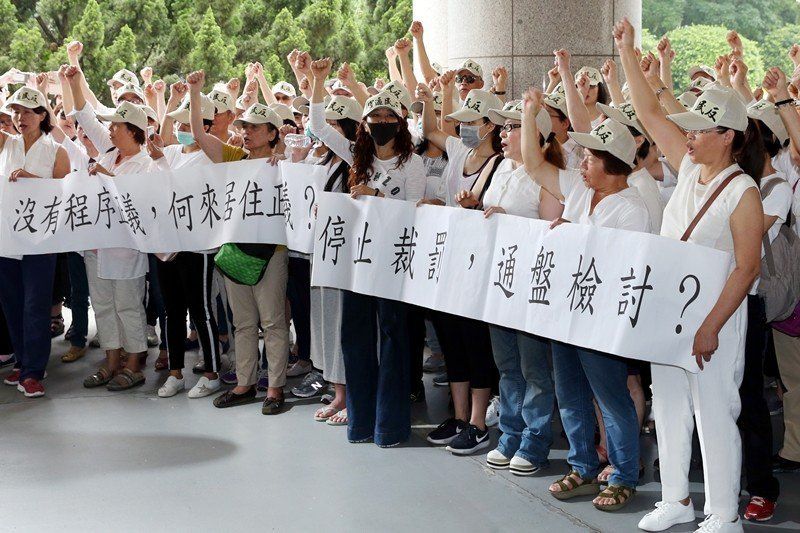Preliminary solution to the doubts about the B-type industrial house disputes: Is it legal on the spot? Who is responsible?
Two days ago, I posted a commentary on the “Long Qun Xiang Xiang”, an industrial house endorsed by Adi. I received a lot of questions from friends. There have been three speeches in the last four days, and I really have no time. I just want to add a little bit to the doubts of these friends. .
Q: In the past, there were many, many B-gong houses that were fine. What's the fuss about this?
A: In the past, old cases were usually only legal on the spot. In Taiwan, if a few people violated the law, the law could deal with them.
Previously, there were more than 2,000 illegal commercial houses in the northern section of Dawan, Taipei City, and the Taipei City Planning Commission could only make concessions, so that these illegal households could pay 52,100 yuan per ping in cash to be legal, and even could not be offset and legal. Differences between dwellings. But in fact, in 2018, the cash on behalf of the people wanted to receive a maximum of 180,000 yuan per ping, but it was constantly lowered by public pressure.

I think it would be unfair to the people who buy legal housing if the cash back cannot be punitive or even have the function of offsetting the price difference. For the households who were petty and cheap and bought illegal commercial houses at that time, they could exit the market profitably.
The old case can only be handled in this way. Of course, the new case must be strengthened to prevent this from happening again. These two things are not in conflict.
I also wrote an article on Big Bend North in 2019 for your reference: https://opinion.udn.com/opinion/story/12838/3929951
Q: This time, Changqunxiangxiang made it clear that he was using the land for B workers, and Adi also said that it was used as a studio. Is there any problem?
A: Of course, there is no problem in setting up construction projects as studios in B-type industrial areas, but it is necessary to stare at them and let them "really use them according to the regulations", and never let them secretly be used as residences.
In fact, Chang Qun Xiangxiang has done his best to "hint that you can be a house, but not cross that line" through his legal counsel. But this is a gray area after all, and if it is viewed under the spotlight, it still cannot stand the test.
For example, Chang Qun Xiangxiang directly mentioned "households" in some of his posts, someone posted that the community was drying clothes outdoors, and some online platforms also directly said that this was a residence, etc. Really need to check carefully In detail, it's hard to pass.
If this level is achieved, the builder can build 163 so-called "studios" in that area and sell them all, which is also his ability.
Q: Will the long group enjoy a penalty? Is Adi responsible?
A: As mentioned earlier, Changqunxiangxiang has avoided responsibility as much as possible, and they will never advertise that it can be used as a residence, but only through hints.
However, if someone really examines all kinds of evidence and reports it to the Fair, the Fair may still claim that, in accordance with Article 21 of the Fair Trade Act, "A matter related to commodities that is sufficient to affect a transaction decision is false or misleading. Representation or representation” and “producing or designing advertisements that attract people’s errors when they know or can be known”, and impose fines on builders and advertisers.
If this case is found to violate the "Fair Trading Law", then Adi, as an advertising endorser (spokesperson), is likely to be jointly and severally liable for damages. Therefore, it has nothing to do with what Adiyepeishi said. The point is that if the product he endorses is deemed to be "misleading" and he is the spokesperson, then he may be jointly and severally responsible.
I think this is a big loss for Adi, because this builder has a bad reputation and a lot of capital. If you are fined, you can just touch your nose and make a fortune; but for YT, which is famous for its reputation, this is very bad. Big damage, so we should be cautious when speaking of endorsements.
Q: What exactly is residential use? Can't I put a bed in my own studio? Or am I not allowed to sleep in the studio more than a few days a week?
A: In fact, I just try to make this project as difficult as possible to use as a residence, and impose a lot of restrictions, so that the market price is not good.
But if you want to say that some people just want a place to sleep, and don’t care about other water, electricity, taxes, household registration, etc., then it is really hard to guard against, and if you are busy with work, you can’t sleep in the studio, the government will also Too many tubes.
At present, Article 77 of the "Construction Law" can enter the community to see the structure and equipment of the building, but there is no way to enter the owner's house. Therefore, what can be aimed at is to reduce the overall profitability of this product, and there is no way to completely deal with individual cases.
--
To support us please donate to OURs Urban Reform
Like my work? Don't forget to support and clap, let me know that you are with me on the road of creation. Keep this enthusiasm together!

- Author
- More